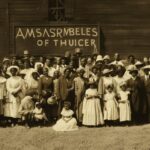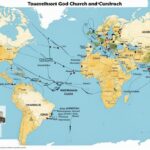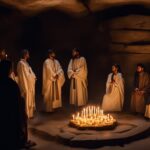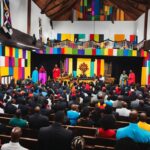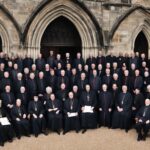The Pentecostal Church is a dynamic movement within Christianity that emerged in the early 20th century. Rooted in the Holiness movement, it is characterized by a focus on a personal experience of God through baptism with the Holy Spirit. The origins of the Pentecostal Church can be traced back to the Azusa Street Revival in Los Angeles in 1906, led by Charles Parham and William Seymour.
Pentecostals believe in the inerrancy of the Bible, the necessity of the New Birth, and the empowerment of the Holy Spirit. They emphasize the use of spiritual gifts, such as speaking in tongues and divine healing, as evidence of the Holy Spirit’s presence in their lives.
Key Takeaways:
- The Pentecostal Church emerged in the early 20th century as a dynamic movement within Christianity.
- It is rooted in the Holiness movement and was characterized by a focus on a personal experience of God through baptism with the Holy Spirit.
- The Azusa Street Revival in 1906 played a significant role in the origins of the Pentecostal Church.
- Pentecostals believe in the inerrancy of the Bible, the necessity of the New Birth, and the empowerment of the Holy Spirit.
- They emphasize the use of spiritual gifts, such as speaking in tongues and divine healing, as evidence of the Holy Spirit’s presence in their lives.
Core Beliefs and Doctrines of the Pentecostal Church
Pentecostals hold firm to a set of core beliefs and doctrines that serve as the bedrock of their faith and shape their distinct identity as a religious movement. At the heart of Pentecostal theology is a vibrant understanding of the Trinity, with a special emphasis on the person and work of the Holy Spirit. This focus on the Holy Spirit stems from the movement’s roots in the Azusa Street Revival, where believers experienced a profound outpouring of the Spirit in their lives and worship.
Salvation and Theology of Salvation: Pentecostals believe in salvation through faith in Jesus Christ, viewing it as a transformative process that leads to a personal relationship with God. They emphasize the need for repentance from sin and the acceptance of Jesus as Lord and Savior. Faith in Jesus Christ is seen as the gateway to salvation and eternal life.
The Baptism with the Holy Spirit: Pentecostals place great importance on the experience of the Baptism with the Holy Spirit as a distinct subsequent work of grace after conversion. This experience is marked by the initial evidence of speaking in tongues and is viewed as an empowerment to live a Spirit-filled life. The Baptism with the Holy Spirit is seen as a transformative encounter that equips believers for ministry and enables the manifestation of spiritual gifts.
Role of the Holy Spirit: Pentecostals have a deep appreciation for the ongoing work of the Holy Spirit in the lives of believers. They believe that the Holy Spirit is active and present in the world today, convicting individuals of sin, guiding them into truth, and empowering them to live lives of holiness. The Holy Spirit is seen as the source of spiritual gifts, such as prophecy, healing, and speaking in tongues, which are seen as crucial for the edification of the body of Christ.
Belief in Divine Healing: Pentecostals hold a strong belief in divine healing and the power of prayer. They believe that God’s healing power is available to believers today and that physical healing can be experienced through faith and prayer. Many Pentecostal churches incorporate times of corporate prayer for healing during their worship services, trusting in God’s supernatural intervention.
“The Holy Spirit is at the center of Pentecostal theology, empowering believers for ministry and enabling the manifestation of spiritual gifts.”
Pentecostal beliefs and doctrines go beyond these foundational elements and encompass a range of theological perspectives on various aspects of Christian faith and practice. However, the understanding and experience of the Holy Spirit remain a unifying and defining characteristic of Pentecostalism.
| Pentecostal Beliefs and Doctrines | Description |
|---|---|
| Trinity | Pentecostals affirm the triune nature of God, emphasizing the roles of Father, Son, and Holy Spirit in their theology. |
| Salvation | Pentecostals believe in salvation through faith in Jesus Christ, emphasizing the need for repentance and acceptance of Jesus as Savior. |
| Baptism with the Holy Spirit | Pentecostals view the Baptism with the Holy Spirit as a distinct subsequent experience after conversion, marked by speaking in tongues. |
| Role of the Holy Spirit | The Holy Spirit is seen as active and present in the lives of believers, empowering them for ministry and enabling the manifestation of spiritual gifts. |
| Divine Healing | Pentecostals believe in divine healing and the power of prayer, viewing physical healing as a manifestation of God’s supernatural intervention. |
In summary, Pentecostal beliefs and doctrines revolve around the central role of the Holy Spirit in the life of the believer, emphasizing salvation through faith in Jesus Christ, the transformative experience of the Baptism with the Holy Spirit, and the ongoing work of the Spirit in empowering believers for ministry and spiritual growth. These doctrines form the theological foundation of the vibrant and dynamic Pentecostal movement.

Sacraments and Rituals in the Pentecostal Church
The Pentecostal Church places a significant emphasis on worship and spiritual practices. While they do not have a formal sacramental theology like some other Christian traditions, Pentecostals do observe certain rituals and practices.
One of the most important sacraments in the Pentecostal Church is baptism. Baptism represents the believer’s identification with the death, burial, and resurrection of Jesus Christ. It is often performed by immersion in water, symbolizing the cleansing and renewal of one’s faith.
Another significant practice is communion, also known as the Lord’s Supper or the Eucharist. Pentecostals believe that through communion, they remember and partake in the sacrifice of Jesus Christ. It involves the sharing of bread and wine (or grape juice) to symbolize the body and blood of Christ.
Pentecostals also have a deep commitment to prayer. They believe in the power of prayer to communicate with God, seek guidance, receive healing, and experience spiritual breakthroughs. Prayer is seen as an integral part of their worship practices and is often characterized by passionate and fervent expressions of devotion.
Throughout their worship services, Pentecostals engage in a range of rituals and worship practices. These practices reflect their emphasis on the presence and work of the Holy Spirit. Worship services often include enthusiastic singing, both traditional hymns and contemporary worship songs, accompanied by musical instruments.
Pentecostals believe in the power of prayer and often incorporate elements of spontaneous and expressive worship in their services.
Pentecostal worship is marked by freedom and openness to the moving of the Holy Spirit. This can include raising hands, clapping, dancing, and speaking in tongues, which is considered the initial evidence of the baptism with the Holy Spirit. Pentecostals believe that by engaging in these practices, they are inviting the presence and power of the Holy Spirit into their midst.
Additionally, Pentecostals value the act of laying hands on individuals for healing and impartation of spiritual gifts. They believe that through the laying on of hands, believers can receive empowerment, guidance, and physical or emotional healing.
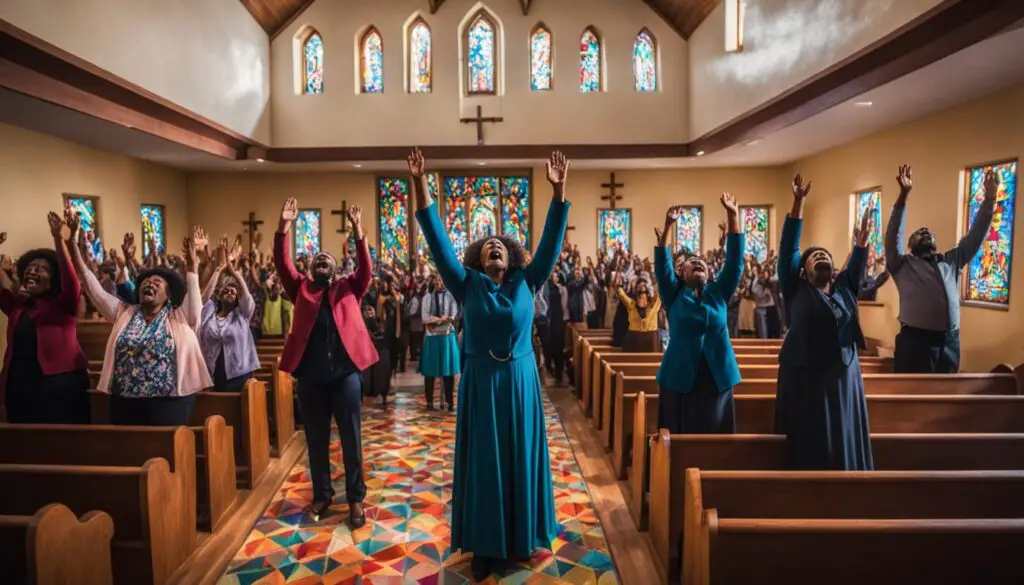
Comparison of Pentecostal Sacraments and Rituals
| Sacraments/Rituals | Pentecostal Beliefs and Practices |
|---|---|
| Baptism | Symbolic representation of the believer’s identification with the death, burial, and resurrection of Jesus Christ; often performed by immersion in water |
| Communion | Remembering and partaking in the sacrifice of Jesus Christ through the sharing of bread and wine/grape juice |
| Prayer | Integral part of worship practices, seen as a powerful means of communication with God, seeking guidance, and experiencing spiritual breakthroughs |
| Spontaneous and Expressive Worship | Enthusiastic singing, clapping, dancing, speaking in tongues, and other expressions of worship, inviting the presence and power of the Holy Spirit |
| Laying on of Hands | Act of imparting spiritual gifts, healing, and empowerment through the laying on of hands |
Leadership and Clergy in the Pentecostal Church
The Pentecostal Church stands apart with its decentralized structure, devoid of a central authority or hierarchy. Each individual congregation operates autonomously, guided by a dedicated pastor or minister who assumes the responsibility of spiritual oversight. Pentecostal ministers are revered as anointed individuals, answering the call of God to serve as leaders within the church. While formal theological education is respected, Pentecostal churches prioritize spiritual qualifications and the manifestation of the Holy Spirit’s gifts in their leaders. The process of ordination within a Pentecostal church or denomination further affirms the spiritual calling and dedication of these ministers.
Worship Practices in the Pentecostal Church
Worship is a central aspect of Pentecostal Church services. Pentecostals engage in enthusiastic singing, both traditional hymns and contemporary worship songs, often accompanied by musical instruments. They believe in the power of praise and worship to invite the presence of the Holy Spirit and create an atmosphere of spiritual renewal.
Pentecostal pastors deliver sermons that are focused on biblical teachings, personal testimonies, and practical application of faith. These sermons inspire and challenge believers to grow in their relationship with God and live out their faith in their daily lives.
The worship services in Pentecostal churches are known for their vibrant and energetic atmosphere. Believers are encouraged to actively engage in worship, expressing their love for God through singing, clapping, and even dancing. There is a sense of freedom and spontaneity, where people are open to the moving of the Holy Spirit.
“Pentecostal worship is an immersive experience, where we connect with God on a deep, personal level. The music and singing lift our spirits, and the sermons inspire us to live for Christ. It’s a time of encountering God’s presence and growing in our faith.”
Key Elements of Pentecostal Worship:
- Enthusiastic singing of both traditional hymns and contemporary worship songs
- Musical accompaniment with instruments
- Emphasis on praise and worship to invite the presence of the Holy Spirit
- Inspirational sermons focused on biblical teachings and personal application of faith
- Active participation and expressions of love for God through clapping, singing, and dancing

| Traditional Hymns | Contemporary Worship Songs | Musical Instruments | Expressions of Worship |
|---|---|---|---|
| A Mighty Fortress Is Our God | What A Beautiful Name | Piano | Clapping |
| Amazing Grace | Reckless Love | Guitar | Singing |
| How Great Thou Art | Good Good Father | Drums | Dancing |
| In Christ Alone | Way Maker | Keyboard | Lifting hands |
Sacred Texts in the Pentecostal Church
The foundation of Pentecostal beliefs and teachings is rooted in the sacred text of the Pentecostal Bible. Pentecostals hold a deep reverence for the Bible, considering it as the authoritative and inerrant Word of God. It serves as a guidebook for their faith, providing spiritual wisdom and guidance for everyday life.
Pentecostals interpret the Bible through a unique Pentecostal lens, emphasizing the work of the Holy Spirit and the manifestation of spiritual gifts described in the New Testament. They believe that the Holy Spirit empowers believers to live a life in accordance with the teachings of the Bible.
To delve deeper into the teachings and principles of the Pentecostal Bible, Pentecostals make use of various study resources, commentaries, and books. These resources provide additional insights and explanations to enhance their understanding of the Bible. Through personal study and prayer, Pentecostals seek to gain spiritual insight and discernment, applying the teachings of the Bible to their daily lives.
“The Bible is not simply a book to be read; it is a living Word that holds the key to spiritual transformation and a closer relationship with God.”
The Importance of the Pentecostal Bible:
- It is the authoritative and inerrant Word of God.
- It provides guidance and wisdom for believers’ lives.
- It emphasizes the work of the Holy Spirit and the manifestation of spiritual gifts.
- It serves as a source of spiritual insight and discernment.
- It forms the basis for Pentecostal beliefs and teachings.
As Pentecostals continue to study and meditate on the sacred texts, they seek to deepen their faith and strengthen their relationship with God.

In the next section, we will explore the various denominations and sects within the Pentecostal Church, each with its own unique beliefs and practices.
Denominations and Sects within the Pentecostal Church
The Pentecostal Church consists of various denominations and sects, each with its own unique emphasis and theological leanings. These diverse expressions of Pentecostalism contribute to the vibrant tapestry of the movement, reflecting the manifold ways in which believers connect with and experience the Holy Spirit.
Some of the major Pentecostal denominations that have gained prominence over the years include:
- Assemblies of God
- Church of God in Christ
- Church of God (Cleveland, Tennessee)
- United Pentecostal Church International
While these denominations may have variations in their specific beliefs and practices, they share a common commitment to the work of the Holy Spirit and the practice of spiritual gifts. The Assemblies of God, for example, emphasizes the importance of the baptism of the Holy Spirit and the evidence of speaking in tongues as a manifestation of the Spirit’s presence.
Within these major denominations, there are also smaller, independent churches and sects that identify as Pentecostal and contribute to the rich tapestry of the Pentecostal movement. These independent churches may have slightly different practices or beliefs but are united by their shared experience of the Holy Spirit and commitment to a vibrant spiritual life.
The diversity of denominations and sects within the Pentecostal Church reflects the dynamic and evolving nature of the movement. It is a testament to the ongoing work of the Holy Spirit and the power of Pentecostalism to reach and impact believers from all walks of life.

Community and Outreach in the Pentecostal Church
Community and outreach are integral components of the Pentecostal Church, reflecting its commitment to fostering relationships, supporting one another, and reaching out to the broader society. In the spirit of love and compassion, Pentecostals prioritize building a strong community within their church, where members can find support, encouragement, and spiritual growth. Through prayer, fellowship, and shared experiences, the Pentecostal community creates a space for believers to connect, build relationships, and deepen their faith.
However, the outreach extends beyond the walls of the church. Pentecostals embrace the call to evangelism, recognizing the significance of sharing the Gospel and spreading the message of salvation to the world. The core belief in the transformative power of Jesus Christ compels Pentecostals to actively engage in various outreach activities, driven by a desire to show God’s love to those in need and offer them hope.
Spreading the Gospel: Pentecostal Missions
Pentecostal missions play a vital role in fulfilling the Great Commission, as described in the Bible. Pentecostals recognize the importance of taking the Gospel to all corners of the earth, recognizing that every person deserves to hear the good news of salvation. Through mission trips, Pentecostals travel to different countries, cultures, and communities, sharing their faith, providing practical assistance, and offering spiritual guidance.
These missions often involve working with local churches, organizations, and communities to address the unique needs of each location. Whether it’s supporting orphanages, providing medical care, facilitating educational programs, or promoting sustainable development, Pentecostals strive to make a positive impact in the lives of those they encounter.
Engaging the Local Community: Pentecostal Outreach
Pentecostal churches actively engage in outreach efforts within their local communities, recognizing that sharing the love and message of Christ begins at home. They organize and participate in various activities aimed at meeting the needs of the community and demonstrating God’s love in tangible ways.
Community service projects are common initiatives undertaken by Pentecostal churches. These projects may include food drives, clothing distributions, homeless shelters, and disaster relief efforts. By offering practical assistance to those facing challenges, Pentecostals show the love and care of Christ, fostering connections and building bridges with the local community.
In addition to community service, Pentecostal churches also organize evangelistic events to engage with individuals who may not have encountered the Gospel before. These events often involve concerts, rallies, or festivals, where people are invited to hear the message of salvation and experience the transforming power of God’s love.
Living out the Faith: Pentecostal Social Involvement
Pentecostals believe that their faith should have a tangible impact on society, motivating them to get involved in addressing social issues and advocating for justice. Inspired by their understanding of biblical teachings, Pentecostals are at the forefront of social involvement, championing causes such as human rights, racial equality, poverty alleviation, and environmental stewardship.
Many Pentecostal churches partner with local organizations and collaborate with other denominations and faith-based groups to tackle societal challenges. They use their collective voice and resources to bring about positive change and address systemic issues that contribute to inequality and suffering.
As part of their commitment to social involvement, Pentecostals actively engage in fostering reconciliation and unity among diverse communities. They strive to break down barriers and promote understanding, emphasizing the significance of love, forgiveness, and reconciliation as core tenets of their faith.
The Pentecostal Church’s deep-rooted sense of community and unwavering commitment to outreach and social involvement exemplify their desire to make a lasting difference in the lives of individuals and communities. By building connections, sharing the Gospel, and actively engaging with the world, Pentecostals embody the transformative power of Christ’s love and offer hope and healing to a broken world.
Architectural and Artistic Features in Pentecostal Church Buildings
Although Pentecostal churches do not have specific requirements for architecture and design, there are common features that can be found in their buildings. Pentecostal churches prioritize practicality and flexibility in their spaces, aiming to create an environment that fosters worship and spiritual expression.
When it comes to decor and artwork, Pentecostal churches often reflect a sense of vibrancy and celebration. While these elements may vary from church to church, they often incorporate symbolic imagery related to the Holy Spirit, biblical scenes, and stained glass windows.
The use of stained glass windows is a prevalent architectural feature in many Pentecostal churches. These windows not only add aesthetic beauty but also serve as a visual representation of the church’s spiritual beliefs. They may depict biblical narratives, religious symbols, or scenes that convey the presence and power of the Holy Spirit.
Artwork depicting biblical scenes is another artistic feature often found in Pentecostal churches. These artworks serve as visual reminders of the foundational stories and teachings of the faith, inspiring worshipers and providing a focal point for reflection and meditation.
The overall decor and ambiance of Pentecostal churches tend to be vibrant and uplifting, creating a space that encourages members to engage in lively worship and express their devotion to God. This includes the arrangement of seating, musical instruments, and audiovisual equipment to facilitate a dynamic worship experience.
Through the thoughtful integration of architectural and artistic elements, Pentecostal churches aim to create an environment that is aesthetically pleasing, spiritually uplifting, and conducive to worship and spiritual expression.
| Architectural and Artistic Features | Description |
|---|---|
| Stained Glass Windows | Stained glass windows are a common feature in Pentecostal churches, depicting biblical narratives and symbols to convey the presence and power of the Holy Spirit. |
| Artwork Depicting Biblical Scenes | Pentecostal churches often display artwork depicting biblical scenes, providing visual reminders of the faith’s foundational stories and teachings. |
| Vibrant Decor | Pentecostal churches prioritize vibrant and uplifting decor to create an environment that encourages lively worship and expression of devotion. |
| Symbolic Imagery | Churches incorporate symbolic imagery related to the Holy Spirit, reinforcing the spiritual beliefs of the Pentecostal faith. |
Contemporary Issues and Challenges in the Pentecostal Church
Like any religious movement, the Pentecostal Church faces its own set of challenges and controversies in the modern world. These challenges arise from the ongoing debates over theology and doctrine that take place within the Pentecostal Church. One such debate centers around the nature and use of spiritual gifts, a topic that continues to spark theological discussions among Pentecostal believers.
Furthermore, the Pentecostal Church grapples with its role in society and how to respond to cultural changes. As the world evolves, Pentecostals are called to examine their beliefs and practices in light of these shifts. This includes addressing questions of social justice and equality, particularly in relation to gender issues.
The contemporary issues faced by the Pentecostal Church require thoughtful and introspective responses. As the movement continues to grow and evolve, Pentecostals seek to navigate these challenges while remaining true to their core beliefs and values. Through theological debates, honest discussions, and a commitment to understanding and engaging with cultural shifts, the Pentecostal community strives to address these issues with the guidance of the Holy Spirit.
“The true measure of a movement’s strength lies in its ability to grapple with the challenges of its time and emerge stronger, more united, and deeply connected to its spiritual roots.”
Key Points:
- The Pentecostal Church faces contemporary challenges and controversies.
- Theological debates surround the nature and use of spiritual gifts.
- The role of the Pentecostal Church in society and its response to cultural changes is an ongoing discussion.
- Pentecostals are grappling with issues of social justice and gender equality.
- The Pentecostal community seeks to navigate these challenges while staying true to its core beliefs and values.
Conclusion: The Enduring Influence and Spirituality of the Pentecostal Church
The Pentecostal Church has left a lasting impact on the Christian landscape, both throughout history and in the present day. Its emphasis on spiritual renewal, personal encounters with God, and the empowering presence of the Holy Spirit continues to shape the lives and faith of millions of believers worldwide. The vibrant worship, deep sense of community, and unwavering commitment to sharing the Gospel are defining characteristics of Pentecostals.
This dynamic movement faces its fair share of challenges and controversies, but it remains resilient in the face of adversity. The Pentecostal legacy is one of inspiration and transformation, as it continues to impact individuals and communities with its unique spirituality and unwavering faith. The influence of the Pentecostal Church extends far beyond its own congregations, leaving an indelible mark on the wider Christian world.
With their fervent worship practices, dedication to community, and unwavering faith, Pentecostals have played a significant role in the spread of the Gospel and the growth of Christianity. Their belief in the power and presence of the Holy Spirit has led to the manifestation of spiritual gifts, inspiring believers to live out their faith in a tangible and powerful way.
In an ever-changing world, the Pentecostal Church remains steadfast in its commitment to its core beliefs and practices. It is this enduring influence and spirituality that continues to draw people from all walks of life to experience the transformative power of the Holy Spirit. The Pentecostal legacy stands as a testament to the faith and dedication of those who have embraced this movement, leaving a lasting impact on the lives and hearts of believers worldwide.
FAQ
What is the history of the Pentecostal Church?
The Pentecostal Church emerged in the early 20th century as a dynamic movement rooted in the Holiness movement. It traces its origins to the Azusa Street Revival in Los Angeles in 1906.
What are the core beliefs and doctrines of the Pentecostal Church?
Pentecostals believe in the Trinity, salvation through faith in Jesus Christ, and the experience of the Baptism with the Holy Spirit marked by speaking in tongues. They emphasize the ongoing work of the Holy Spirit and the manifestation of spiritual gifts.
What are the sacraments and rituals in the Pentecostal Church?
While not having a formal sacramental theology, Pentecostals practice baptism and communion. They view these rituals as spiritually significant rather than mere physical observances. Prayer is also a central aspect of their worship.
Who are the leaders and clergy in the Pentecostal Church?
Pentecostal churches have a decentralized structure, with each individual church led by a pastor or minister who is responsible for spiritual oversight. Pentecostal ministers are seen as anointed individuals called by God, prioritizing spiritual qualifications over formal theological education.
What are the worship practices in the Pentecostal Church?
Pentecostal worship is characterized by enthusiastic singing, prayer, and an openness to the moving of the Holy Spirit. Pastors deliver sermons focused on biblical teachings, personal testimonies, and practical application of faith.
What are the sacred texts in the Pentecostal Church?
The primary sacred text for Pentecostals is the Bible, which they believe to be the inspired Word of God. They interpret it through a Pentecostal lens, emphasizing the work of the Holy Spirit and the spiritual gifts described in the New Testament.
What are the denominations and sects within the Pentecostal Church?
The Pentecostal Church is composed of various denominations and sects, including the Assemblies of God, Church of God in Christ, Church of God (Cleveland, Tennessee), and United Pentecostal Church International.
What is the community and outreach like in the Pentecostal Church?
Pentecostals place a strong emphasis on building relationships within their church communities and supporting one another through prayer and fellowship. They also prioritize evangelism and missions, seeking to spread the Gospel and share the love of Christ.
What are the architectural and artistic features in Pentecostal Church buildings?
Pentecostal churches prioritize practicality and flexibility in their spaces, creating environments conducive to worship and spiritual expression. Decorations and artwork vary but often reflect a sense of vibrancy and celebration.
What are the contemporary issues and challenges in the Pentecostal Church?
The Pentecostal Church grapples with debates over theology, engagement with cultural changes, and approaches to issues such as social justice and gender equality. It seeks to navigate these challenges while remaining true to its core beliefs and values.
What is the enduring influence and spirituality of the Pentecostal Church?
The Pentecostal Church has had a profound influence on Christianity, characterized by vibrant worship, dedication to community, and a commitment to sharing the Gospel. Its unique spirituality and unwavering faith in the power of the Holy Spirit continue to inspire and impact people worldwide.



